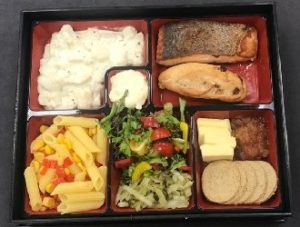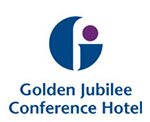The Golden Jubilee Conference Hotel is committed to offering a four-star dining experience to all of our delegates and guests. We have undertaken a thorough and extensive review to ensure that all aspects of our food service delivery continues to be safe.
The safety of our delegates is very important to us and the changes that we are putting in place will take into account physical distancing and enhanced hygiene measures, whilst also delivering our usual high quality service.
Food Safety Plan
1. Safety is the responsibility of everyone in our business and staff training is an invaluable method in helping our team understand their responsibility and how we can operate safely.
2. We will offer 3 different types of Food & Beverage service:
-
- Contact Free
- Limited Contact
- Normal Service
3. Reduced Menus – to recognise the availability of fresh, local ingredients and physical distancing within our kitchen.
4. Use of our mobile app to allow customers to order food and drink, minimising the need for printed menus
5. Increase our In room dining service offering
6. Sanitisation stations located in our restaurants, bar and lobby areas.
7. Promoting cashless transactions
Conference Food
For our conference delegates our contact-free food offering will consist of prepacked “grab and go” meals prepared by our team of award winning chefs using the best local produce. We will also offer our Bento box lunch as an alternative to allow for private in room conference dining.

Food at Home
Bored during lockdown? We’ve developed our most popular menu items into easy-to-follow recipes to allow you to sample at home. From Chocolate Brownies to Chilli Lime Chicken, what’s your favourite?

Food for Health
We believe in eating the right foods. Our team at the Centre for Health & Wellbeing has provided us with some simple tips to help us while we are working from home, home schooling and looking after loved ones.
- Drink plenty of fluids – staying hydrated can help increase our cognitive functions and allow us to be more alert
- Exercise more – even a simple brisk walk will help release endorphins, which is a natural chemical in our brains that helps us to feel good.
- Eat regularly – this keeps our metabolism active and can help prevent tiredness
- Eat your 5 portions of fruit and veg a day – they contain essential vitamins and minerals.
During these challenging times, we want to encourage everyone to stay safe and healthy. This means taking care of both your physical and mental wellbeing.
As lockdown begins to ease, it is normal to become anxious, nervous or stressed about doing things that have not been part of your regular routine for some time. Physical distancing can affect your normal day to day activities and physical activity routines.
Our team at the Centre for Health and Wellbeing have come up with some ways in which you can take care of your physical and mental health:
-
-
- Taking the same route for your run, cycle or walk can become monotonous and boring and often lead to a lack of motivation. Try taking a different route to explore and stimulate your senses and concentration levels. Listen to your favourite podcast or E-book.
- Eat well balanced meals, drink enough water.
- Try to maintain your regular sleep patterns and routines. Achieving a regular 8 hours of sleep can help to maintain a healthy mind.
- Continue to connect with others. Maintaining relationships with people you trust is important for your mental wellbeing.
- Talk about your worries. This is a difficult time for everyone and sharing how you are feeling with family and friends can help. If you do not feel able to do this there are a range of helplines that can be contacted eg, Scottish Association for Mental Health
- Keep your mind active and do things you enjoy, focus on your favourite hobby, learning something new or taking time to write / read should give some relief from anxious thoughts and feelings.
- Spend time in nature. Spending time in green spaces can benefit both your mental and physical wellbeing.
-
In a world where staying in has quickly become the new going out, people are embracing new ways of communicating online. What does this mean for the future of meetings and events, an industry centred around bringing people together?
With social distancing likely to continue after lockdown, hybrid meetings may become an effective compromise. Events take place with a smaller live attendance whilst other participants join online.
Would delegates prefer the freedom of remote events or would they feel short-changed with the lack of interaction with others? Here, we weigh up the benefits of both the hybrid and the face-to-face meeting.
Hybrid meetings offer a more inclusive way for delegates to take part. Delegates can choose whether to attend in person at a venue or to join remotely. If travel is a problem then delegates can join the meeting virtually, cutting out travel time and costs. This increased productivity may encourage more delegates to attend whilst also reducing our carbon footprint with less numbers travelling.
Diary clashes no longer matter. The video element is easily recorded and can be made available online after the live event. This on-demand feature allows delegates to access the meeting content at a time convenient for them and they no longer miss out if they are unable to attend the original meeting.
The ease of joining hybrid meetings can widen the number of participants involved and may also attract a new audience. Delegates could be more tempted to join online first to see what’s going on – with less commitment in a virtual setting and no fear of entering an event on your own. This might encourage them to attend in person in the future.
Even remotely, delegates can still get in involved in some of the interaction offered at a live event. Two-way video chat allows participation in Q&A sessions. Various platforms such as Zoom or Slido can encourage virtual delegates to get involved through polls and online messaging can create a dialogue for those taking part remotely.
Meeting organisers are also offered a choice on how many can take part in person and online. With delegates able to join remotely, organisers can consider hiring a smaller meeting space. Meeting consumables are also reduced, with less delegate badges, printed literature and catering needed. This will no doubt cut down costs and staffing required, perhaps making it easier and more profitable for organisations to host events more regularly.
After lockdown, delegates may welcome the chance to interact with each other again and join meetings in person. The face to face meeting brings people together – communication is easier and the social aspect of conferences is a great opportunity to build relationships.
A warmer atmosphere can be conveyed face to face – from the welcome at the registration desk to the speaker being able to read body language in the room. The traditional meeting helps two-way communication flow, meaning that messages are less likely to be lost than with an online meeting.
Delegates can also engage more freely with others and network, through group discussion offered within the meeting programme or by chatting during coffee breaks. These opportunities supplement the meeting content and often the takeaways here can be just as valuable as the sessions themselves.
There are far less distractions in a conference room. Whilst there is more flexibility when joining a virtual meeting, how likely is it that a colleague may interrupt to discuss something in the office, or incoming emails become a distraction? Not to mention the countless distractions at home. In a venue, delegates can fully focus on the meeting content, switch off their phones and are less likely to wander off to make a coffee mid-presentation.
Technical issues are reduced in a face to face setting. Delegates attending in person don’t need to think about their internet connection dropping out. The pressure is also eased for the organiser as they don’t need to worry about speakers joining virtually or problems with the video syncing up with slides. Whilst many venues can offer a technician service to help with in-house equipment, they will be unlikely to help with participants having problems remotely.
There’s still so much uncertainty on how the world will look post-Coronavirus but the Golden Jubilee Conference hotel will continue to support organisers and offer options for both the hybrid and face to face meeting. Get in touch with us to find out more at conferences@goldenjubilee.scot.nhs.uk or on 0141 951 6003.

